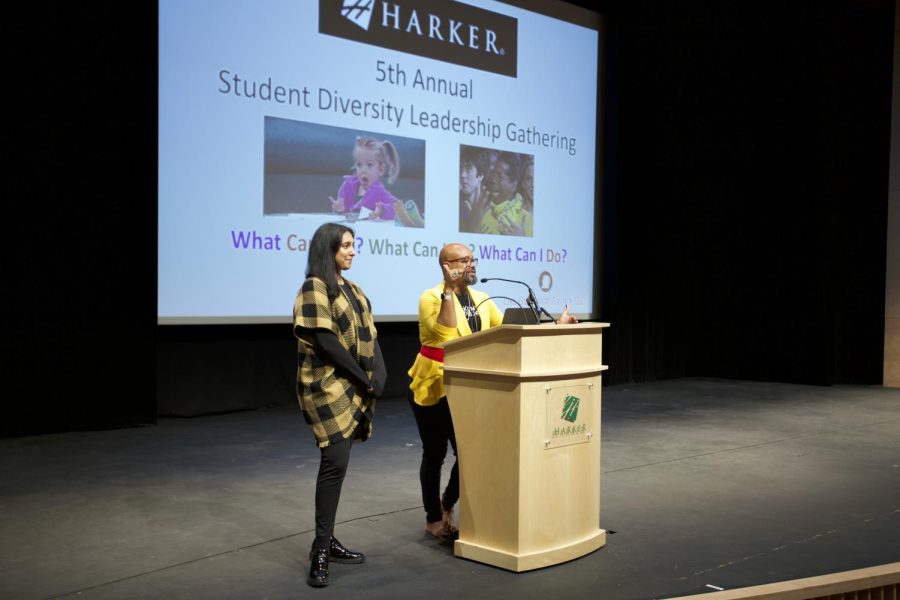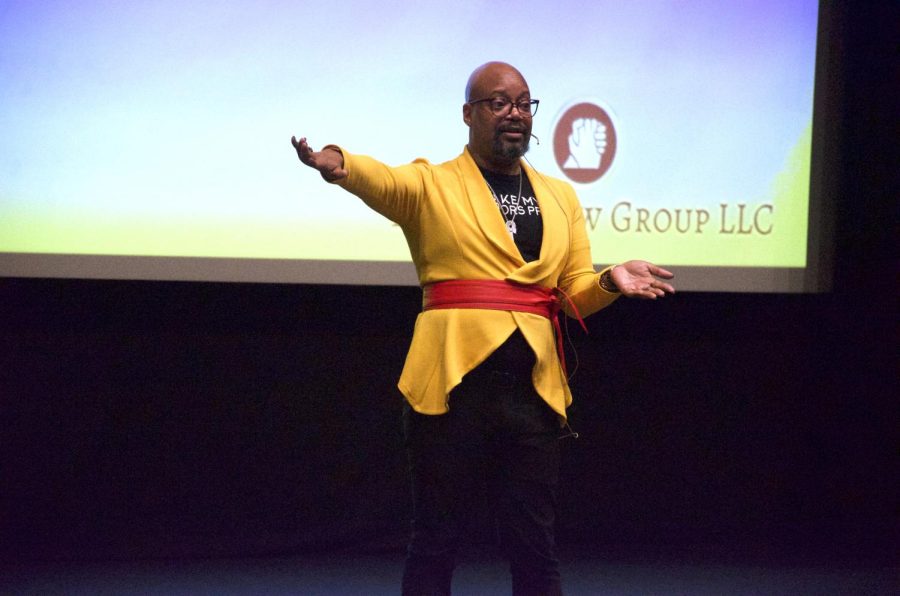Upper school hosts over 30 schools in fifth Student Diversity Leadership Gathering event
Francis Parker School assistant head Priyanka Rupani and national Student Diversity Leadership Conference (SDLC) chair Dr. Rodney Glasgow give a presentation at the fifth annual Student Diversity Leadership Gathering (SDLG) on Feb. 4. The event garnered high school students and faculty from over 30 schools to discuss issues of diversity, equity and inclusion.
Around 200 Bay Area high school students and faculty members engaged in the fifth annual Student Diversity Leadership Gathering (SDLG) at the upper school campus on Feb. 4, exploring the theme of “What Can I Do? What Can I Do? What Can I Do?,” with keynote speakers Dr. Rodney Glasgow and Priyanka Rupani.
“Being in person makes the event a lot more emotive and personal,” Student Diversity Coalition (SDC) Leader Iris Fu (11) said. “[What Can I Do?] really is a conversation about perspective, activism, and what changes you can make as students and faculty members.”
The SDLG began four years ago when a group of Harker students expressed disappointment after not being able to attend the Student Diversity Leadership Conference (SDLC), a national conference for private schools with similar goals as the SDLG. With the goal of creating camaraderie amongst Bay Area schools and emulating the SDLC on a local level, upper school teachers reached out to Dr. Glasgow, head of the Quaker school at Sandy Spring Friends School and chair of the SDLC, who has been leading the event in collaboration with SDC advisors and student leaders ever since. Held in February each year in honor of Black History Month, the SDLG invites schools from across Northern California to discuss the issues of diversity, equity and inclusion.
“I take this work personally,” Nueva School Dean of Students Jackee Bruno, who participated in the event, said. “And I also want to spread that awareness. I think Nueva has some ambitions in DEI that make bringing our students to something like [the SDLG] very beneficial.”
The day began at 8:30 a.m. with breakfast and registration in the Rothschild Performing Arts Center (RPAC) lobby. In addition, participants had the chance to chat and play bingo to get to know each other. At 9 a.m., Dr. Glasgow delivered a keynote speech about his experience as a Black school administrator. Dr. Glasgow is a Baltimore native and had the opportunity to attend a private school, something that he says has had a great impact on his life.
“Private school gave me so much –– I wouldn’t be here without [the Gilman School],” Dr. Glasgow said. “Growing up, I was Black and low income in Baltimore in the 90s. As a boy, I may not even literally have been here, [as] I saw so much death on the news around that. So, I am so thankful, and from a place of love, I challenge independent schools to be what I know they can be.”
Following keynote speeches, students and teachers engaged in sessions with Dr. Glasgow and Priyanka Rupani, assistant head of school at Francis Parker School and colleague of Dr. Glasgow. The adults engaged in conversations about how to foster inclusive environments at school with Rupani. In the meantime, during the students’ session with Dr. Glasgow, the students partook in group sessions and games in which they explored identity and the difference of perspectives across different groups.
“I heard about the SDLG from a friend of mine, who said it was a great experience,” Aimee Yang, a student at The Branson School, said. “I [wanted] to meet new people from all over the Bay Area who have some shared experiences and to hear different perspectives.”
As he conversed and talked to students, Dr. Glasgow, who walked bare-foot, gradually revealed some explanations behind his form of presentation and his passion for his work in schools.
“Taking off your shoes is a sign of comfort and a sign of being at home,” Dr. Glasgow said. “I will remove my shoes because I believe I do sacred work. I believe everywhere I go could be made sacred if we would just connect with the divine that’s there.”
Following group activities, students listened to a presentation from Dr. Glasgow which laid out the steps and actions that students can take when raising an issue to school administrators. According to Dr. Glasgow, inspiring change in schools is a difficult process, especially when the students bring up an issue. However, Dr. Glasgow emphasized the importance of finding a central issue and pursuing it.
“What I appreciate about what the students reflected with me afterwards was [that] they found their confidence, their passion,” Dr. Glasgow said in an interview with Harker Aquila. “No matter what anybody else says, that’s what you want them to have, whatever their cause is. They all got something different that they’re drawn to address in the world, and thank goodness they all got something different.”
Before the closing of the event, all teachers and students came together in the RPAC theater for a final activity with Dr. Glasgow and Rupani, centered on the topic of whistleblowing. As a group activity, their presentation slides presented different scenarios happening on different days of the week, and students and teachers were given the choice to stand up and blow their whistle, or save them for another day. The different scenarios prompted different reactions, which fostered a sharing environment in which many attendees described why and what they would and wouldn’t stand up for.
“[Students’] greatest strength is that they are willing to stand up to and stand out from their peers, that they are willing to say, ‘This is the thing I’m doing’,” Dr. Glasgow said. “So many young people don’t do that because they fear, ‘What will happen if my peers don’t accept me?’ We saw that in the final exercise [students] talked about the whistle blowing and the things in schools that they are going to stand up against. And thank goodness they do.”
As the event came to an end at 4 p.m., Dr. Glasgow gave a final speech to all student attendees and teachers. As he spoke, he removed his outer kimono jacket to reveal the writing on his shirt, which read, “I make my ancestors proud.”
“I graduated [from] Gilman in 1997,” Dr. Glasgow said. “So almost 30 years ago, [and] I’m still hearing some of the same stories I could have told. We got to stop that, and that’s why I get up in the morning.”
A previous version of this article included an incorrect link to the Francis Parker School’s website. The article has been updated on March 2, 2023, to reflect the correction of this error.
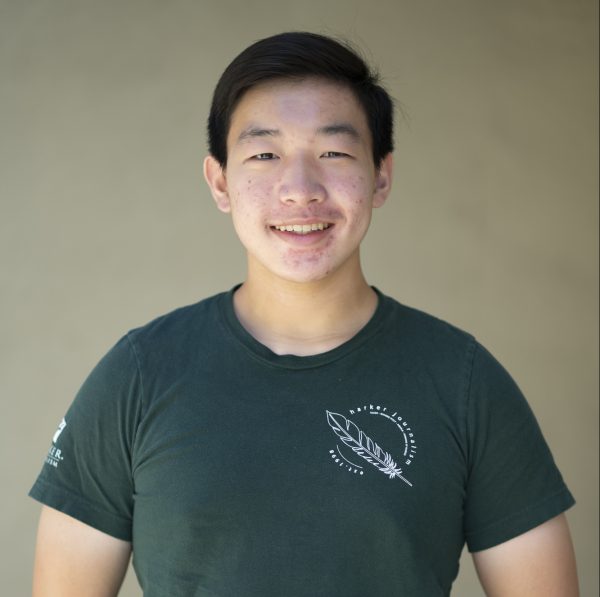
Edward Huang (12) is a co-managing editor for the Winged Post, and this is his fourth year on staff. This year, Edward wants to continue creating unique...
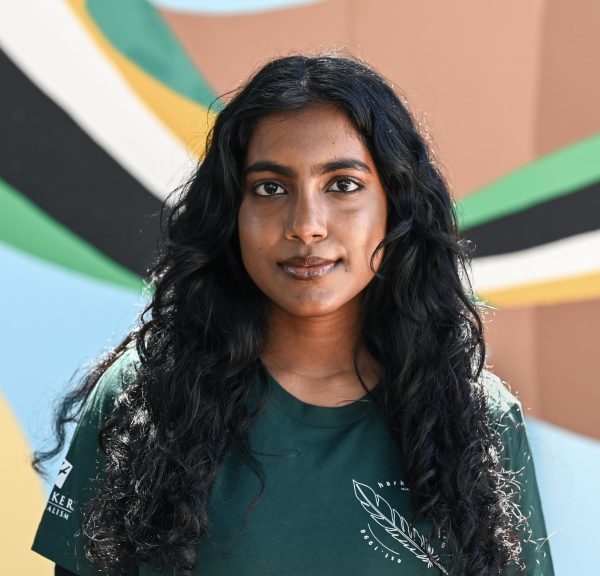
Hima Thota (12) is a Managing editor for the Harker Aquila, and this is her fourth year on staff. Hima looks forward to capturing student and campus life...
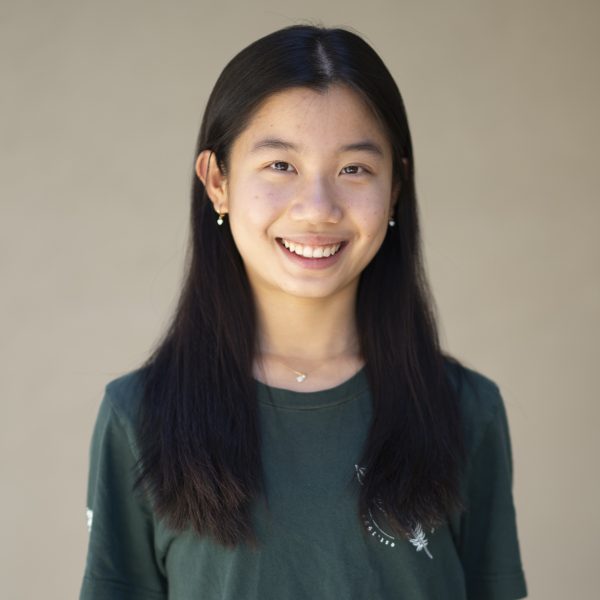
Ella Yee (12) is the co-editor-in-chief of Harker Aquila, and this is her fourth year on staff. This year, Ella hopes to continue bonding with the journalism...


















![“[Building nerf blasters] became this outlet of creativity for me that hasn't been matched by anything else. The process [of] making a build complete to your desire is such a painstakingly difficult process, but I've had to learn from [the skills needed from] soldering to proper painting. There's so many different options for everything, if you think about it, it exists. The best part is [that] if it doesn't exist, you can build it yourself," Ishaan Parate said.](https://harkeraquila.com/wp-content/uploads/2022/08/DSC_8149-900x604.jpg)




![“When I came into high school, I was ready to be a follower. But DECA was a game changer for me. It helped me overcome my fear of public speaking, and it's played such a major role in who I've become today. To be able to successfully lead a chapter of 150 students, an officer team and be one of the upperclassmen I once really admired is something I'm [really] proud of,” Anvitha Tummala ('21) said.](https://harkeraquila.com/wp-content/uploads/2021/07/Screen-Shot-2021-07-25-at-9.50.05-AM-900x594.png)







![“I think getting up in the morning and having a sense of purpose [is exciting]. I think without a certain amount of drive, life is kind of obsolete and mundane, and I think having that every single day is what makes each day unique and kind of makes life exciting,” Neymika Jain (12) said.](https://harkeraquila.com/wp-content/uploads/2017/06/Screen-Shot-2017-06-03-at-4.54.16-PM.png)








![“My slogan is ‘slow feet, don’t eat, and I’m hungry.’ You need to run fast to get where you are–you aren't going to get those championships if you aren't fast,” Angel Cervantes (12) said. “I want to do well in school on my tests and in track and win championships for my team. I live by that, [and] I can do that anywhere: in the classroom or on the field.”](https://harkeraquila.com/wp-content/uploads/2018/06/DSC5146-900x601.jpg)
![“[Volleyball has] taught me how to fall correctly, and another thing it taught is that you don’t have to be the best at something to be good at it. If you just hit the ball in a smart way, then it still scores points and you’re good at it. You could be a background player and still make a much bigger impact on the team than you would think,” Anya Gert (’20) said.](https://harkeraquila.com/wp-content/uploads/2020/06/AnnaGert_JinTuan_HoHPhotoEdited-600x900.jpeg)

![“I'm not nearly there yet, but [my confidence has] definitely been getting better since I was pretty shy and timid coming into Harker my freshman year. I know that there's a lot of people that are really confident in what they do, and I really admire them. Everyone's so driven and that has really pushed me to kind of try to find my own place in high school and be more confident,” Alyssa Huang (’20) said.](https://harkeraquila.com/wp-content/uploads/2020/06/AlyssaHuang_EmilyChen_HoHPhoto-900x749.jpeg)



